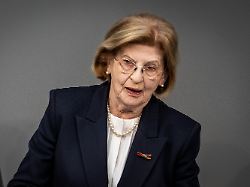Holocaust commemoration in the Bundestag
Auschwitz survivor Szepesi: “‘Never again’ is now”
January 31, 2024, 12:17 p.m
Bundestag President Bas, Auschwitz survivor Szepesi and journalist Reif commemorate the victims of the Holocaust with emotional speeches. Szepesi emphasizes that anti-Semitism must be combated not only on such occasions, but in everyday life. It hurts when her great-grandchildren have to be protected with machine guns.
The Bundestag remembered the victims of National Socialism with urgent calls for resistance against anti-Semitism. In her speech, Parliament President Bärbel Bas emphasized everyone’s responsibility to oppose hatred of Jews. “‘Never again’ was, is and remains a task for our entire society,” said Bas. In an emotional speech, Auschwitz survivor Eva Szepesi called for more humanity: “It has never been more important than now. Because ‘Never again’ is now.”
Bas pointed out that over 2,000 anti-Semitic crimes have been committed in Germany since the Hamas attack on Israel on October 7th. “This outbreak of anti-Semitism is a disgrace for our country.” She emphasized: “Hate of Jews is not just a problem of the past. Anti-Semitism is a problem of the present.”
Regarding the increasing violence against Jews in this country, the President of the Bundestag said: “Germany cannot and will not remain silent about it.” She emphasized: “We stand in solidarity with the Jews. And we raise our voice against any form of hatred of Jews!”
It is necessary to constantly re-agreed on the responsibility of “never again”. “Everyone can and must contribute.” It is our obligation to pass on this commandment with the same strength and conviction, from generation to generation.” The President of the Bundestag warned: “This responsibility does not expire.”
Szepesi: “The Shoah did not begin in Auschwitz”
Szepesi, now 92, expressed concern that Jewish children and young people are afraid to go to school “just because they are Jews.” Szepesi, whose parents and younger brother were killed by the Nazis, said: “It pains me when my great-grandchildren have to be protected by police with machine guns just because they are Jews.”
“The Shoah did not begin with Auschwitz,” emphasized Szepesi, “it began with words, it began with silence and society turning a blind eye.” She would like “the murdered Jews to be remembered not only on memorial days, but also the living ones in everyday life. They need protection now.”
Szepesi called it “great” that hundreds of thousands of people have taken to the streets against right-wing extremism in recent weeks. However, she would like “these demonstrators to speak out loudly among their friends and at work when anti-human statements are made.” Those who remain silent are “complicit”.
Bas: Mass protests show the resilience of democracy
Bas also pointed out that hundreds of thousands had stood up in the past few weeks. They all showed: “Our democracy is diverse, lively and defensive.” The President of Parliament appealed: “Let us all have the courage not to remain silent, but to resolutely confront hatred and inhumanity.”
Szepesi was deported to the Auschwitz-Birkenau extermination camp at the age of twelve. She survived there because guards already thought she was dead. In an emotional speech, Szepesi reported on her life story and the liberation of the camp on January 27, 1945 by the Soviet army.
After Bas and Szepesi, sports journalist Marcel Reif spoke. Reif’s father was a Polish Jew who narrowly escaped being deported to a concentration camp by the National Socialists during the war. Close family members of Reif were killed at the time.
Federal President Frank-Walter Steinmeier, Federal Chancellor Olaf Scholz, Constitutional Court President Stephan Harbarth and Federal Council President Manuela Schwesig also took part in the memorial hour.
